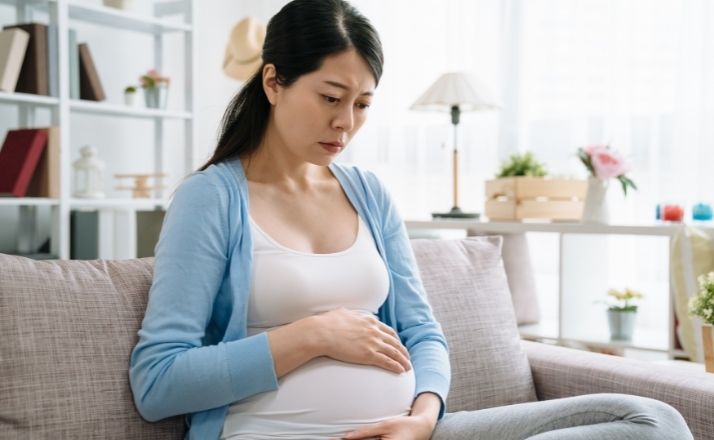I suffered from perinatal depression and was ashamed to admit it.
I held the test in my hand and watched two lines appear. We had been married 9 months and trying for a baby for the past 2 months. I thought when I saw the two lines I would feel elated, but instead of joy, I just felt fear.
Of course, having a baby was our plan. I’ve always wanted a big family, and even though this is what we expected, I wasn’t prepared for the huge change that was about to happen to my body and my life.
What I didn’t know, was that this was the start of my perinatal depression. And it would stay with me for my entire pregnancy. With this, I felt shame. Embarrassed that I would have these emotions during my pregnancy.
Along with the millions of pregnant women who suffer from perinatal depression, I felt scared that people would judge me for feeling like this.
I didn’t want to complain or let anyone know how alone I was feeling. I was scared to talk to anyone close to me, and I probably wouldn’t have if it wasn’t for my husband. He noticed how I had changed and how sad I had become and encouraged me to talk to my midwife.
I was then put in touch with the perinatal team, who provided invaluable support through my pregnancy. But this was not something other women talked about. And even with that support in place, I still felt so alone and like I was the only pregnant woman to feel how I was feeling.
I was lucky that my husband was able to recognize the changes in me and encouraged me to get help. I felt like people around me would talk, and wonder why I felt like this. And honestly, I felt the same.
Why would I be suffering from perinatal depression when I had a loving husband and was pregnant with my much-wanted first child?

I should have felt blessed and lucky, not scared, sad and alone. Feeling this way takes everything from you, which makes it even harder to find the strength to open up.
Being pregnant is supposed to be one of the happiest times of your life. But hormones are a tricky thing. People are very quick to say it’s just hormones when someone who is pregnant feels sad or down.
Social media is full of posts and articles about how women should “glow” and “blossom” and embrace their changing body. This was far from how I felt when I was pregnant with my first. And this feeling came with me into my subsequent pregnancies.
I waited for my body to change the way it does in the movies, hoping one day I would wake up with a neat little bump, a rosy glow to my cheeks, and shiny bouncy hair.
But it was nothing like that.
The first 20 weeks my stomach was just wobbly, and my skin turned into that of an acne-ridden teenager. My body was no longer just mine and no longer under my control. I would do my upmost to hide my bump from being on show.
On the one occasion I wore a dress that showed off my pregnant belly, a work colleague commented that his wife, who was at the same stage of pregnancy as me, was nowhere near as big as I was.
A flippant comment to him, but to me that just made me hate the way I looked even more, and made me cover up even more.
But feelings about my body weren’t the only reason I felt the way I did.
Pregnancy for me brought up memories from my own childhood — and fears that I wouldn’t be good enough to be a mum to my baby. That I wouldn’t be strong enough to rectify the mistakes made in my childhood by significant adults in my life.
These were all feelings that contributed to my perinatal depression and made it even harder to talk about. I couldn’t help thinking that people would judge me terribly for not being joyous and glowing.
Even now, as “woke” as it is to talk about our mental health struggles, there still seems to be such a stigma surrounding the way a pregnant woman should feel about the changes in her life. Why did it take for my husband to tell me I wasn’t OK for me to get help?
Pregnant women should be able to put their hand up and say, “I’m not OK,” without fear of judgement or being seen as being unable to cope.
We need to make this something we talk about. We need to make this something that all pregnant women are aware of, and be able to recognize the signs.
Four pregnancies and almost 6 years of therapy in and I am finally able to cope with how I felt. That’s not to say these feelings go away with each pregnancy. They just lessen, and it becomes easier to cope with.
I am so blessed I had the support I had, but not everyone is so lucky. Not everyone is in that position to be pushed to get help. I hope that by sharing how we feel, that women will be encouraged to talk.
Talk about their mental health during pregnancy, even if it’s “just hormones.” Because a lot of the time, it is so much more than that. We should never let anyone get to the stage where they’re too afraid to talk about how they’re feeling because of how other people may respond.
Perinatal depression is real, and it’s OK to not be OK when you’re pregnant and ask for help.











